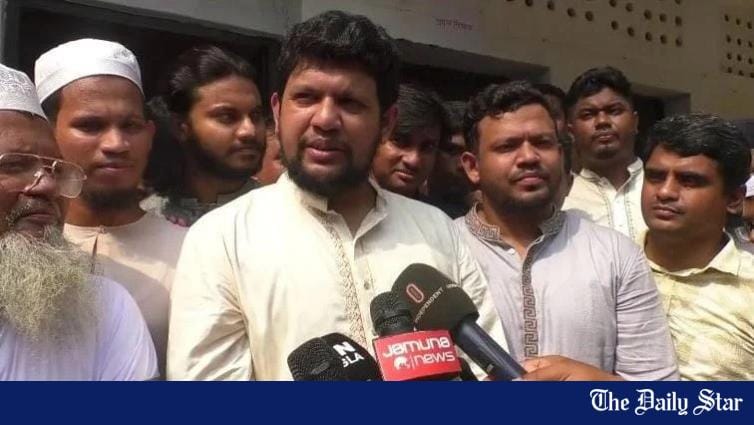- Copy to clipboard
- Thread starter
- #46
Saif
Senior Member
- Jan 24, 2024
- 11,088
- 6,125
- Origin

- Residence

- Axis Group


Awami League is ‘already banned in people’s hearts’, says Jamaat chief Shafiqur
Jamaat-e-Islami chief Shafiqur Rahman has said the Awami League, ousted through mass uprising, is “already banned in the hearts and minds of the people”. He made the statement while speaking to reporters on Monday after attending Eid prayers at the Baitul Mukarram National Mosque and v
Awami League is ‘already banned in people’s hearts’, says Jamaat chief Shafiqur
FE ONLINE DESK
Published :
Mar 31, 2025 17:48
Updated :
Mar 31, 2025 22:46

Jamaat-e-Islami chief Shafiqur Rahman has said the Awami League, ousted through mass uprising, is “already banned in the hearts and minds of the people”.
He made the statement while speaking to reporters on Monday after attending Eid prayers at the Baitul Mukarram National Mosque and visiting the families of several victims of the July-August Uprising.
According to a bdnews24.come report, Shafiqur said: “It is Allah who has banned them [the Awami League] and the people have done the same in their hearts. If they are not a banned group, then why have they all fled?”
On the issue of justice for the victims of the uprising that ended the Awami League’s 15-year rule, he added: “Justice is their right—an undeniable right of the families who have suffered. Justice must be served.”
“True justice will come in the hereafter, but in this world, they deserve justice too—and it will happen.”
Earlier, after offering Eid prayers at Baitul Mukarram, Shafiqur said many families in Bangladesh were unable to celebrate the festival as they continued to grieve their loved ones, who lost their lives during the July Uprising. “Many mothers are still grieving for their children. Those responsible for the July-August massacre must be brought to justice.”
“People want to see justice that deters future atrocities—justice that ensures no killer can again toy with human lives. If those who were injured or lost loved ones see that justice is truly served, it might bring them some comfort.”
Sharing his vision for a future Bangladesh, Shafiqur said: “We want a country where bloodshed is no longer part of politics. Where human lives are not treated as disposable. A society where people live with love, dignity, equality, and respect.”
“No one should be judged or deprived of their rights based on their religion. All citizens must enjoy equal rights. And we believe such a society can only be achieved by implementing the laws of Allah as set forth in the Quran. That’s the society we’re fighting for—a hunger-free, just society.”
FE ONLINE DESK
Published :
Mar 31, 2025 17:48
Updated :
Mar 31, 2025 22:46
Jamaat-e-Islami chief Shafiqur Rahman has said the Awami League, ousted through mass uprising, is “already banned in the hearts and minds of the people”.
He made the statement while speaking to reporters on Monday after attending Eid prayers at the Baitul Mukarram National Mosque and visiting the families of several victims of the July-August Uprising.
According to a bdnews24.come report, Shafiqur said: “It is Allah who has banned them [the Awami League] and the people have done the same in their hearts. If they are not a banned group, then why have they all fled?”
On the issue of justice for the victims of the uprising that ended the Awami League’s 15-year rule, he added: “Justice is their right—an undeniable right of the families who have suffered. Justice must be served.”
“True justice will come in the hereafter, but in this world, they deserve justice too—and it will happen.”
Earlier, after offering Eid prayers at Baitul Mukarram, Shafiqur said many families in Bangladesh were unable to celebrate the festival as they continued to grieve their loved ones, who lost their lives during the July Uprising. “Many mothers are still grieving for their children. Those responsible for the July-August massacre must be brought to justice.”
“People want to see justice that deters future atrocities—justice that ensures no killer can again toy with human lives. If those who were injured or lost loved ones see that justice is truly served, it might bring them some comfort.”
Sharing his vision for a future Bangladesh, Shafiqur said: “We want a country where bloodshed is no longer part of politics. Where human lives are not treated as disposable. A society where people live with love, dignity, equality, and respect.”
“No one should be judged or deprived of their rights based on their religion. All citizens must enjoy equal rights. And we believe such a society can only be achieved by implementing the laws of Allah as set forth in the Quran. That’s the society we’re fighting for—a hunger-free, just society.”





